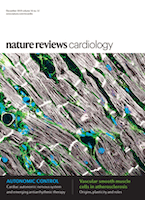
Nature Reviews Cardiology
Scope & Guideline
Empowering Healthcare through Cutting-Edge Cardiology Reviews
Introduction
Aims and Scopes
- Cardiovascular Disease Mechanisms:
Investigation of the underlying biological and physiological mechanisms of cardiovascular diseases, including atherosclerosis, heart failure, and arrhythmias. - Clinical Trials and Therapeutics:
Analysis and reporting on clinical trials evaluating new therapies, drugs, and interventions designed to improve cardiovascular health outcomes. - Epidemiology and Public Health:
Focus on the epidemiological trends of cardiovascular diseases across different populations and demographics, emphasizing risk factors and preventive strategies. - Innovative Imaging and Diagnostic Techniques:
Exploration of advanced imaging modalities and diagnostic techniques that enhance the assessment of cardiovascular conditions. - Translational Research:
Promotion of research that bridges the gap between laboratory findings and clinical applications, aiming to translate discoveries into practical treatments. - Gender and Ethnic Disparities in Cardiovascular Health:
Investigation of how gender and ethnicity affect cardiovascular disease risk, outcomes, and treatment responses.
Trending and Emerging
- Cardio-Oncology:
The intersection of cardiovascular disease and cancer care is emerging as a significant area of research, addressing the cardiovascular risks associated with cancer therapies. - Microbiome and Cardiovascular Health:
Research focusing on the gut microbiome's influence on cardiovascular health is gaining momentum, with studies exploring its role in disease processes and treatment outcomes. - Personalized Medicine and Genomics:
There is an increasing emphasis on personalized approaches to cardiovascular care, utilizing genomic data to tailor treatments and understand individual risk factors. - Artificial Intelligence in Cardiology:
The application of AI and machine learning in cardiovascular diagnostics and management is rapidly growing, with research exploring its potential to improve patient outcomes. - Inflammation and Immune Response:
An emerging focus on the role of inflammation and immune mechanisms in cardiovascular diseases highlights new therapeutic targets and strategies. - Social Determinants of Health:
Research addressing how social factors influence cardiovascular health outcomes is increasingly prominent, underscoring the importance of equity in healthcare access and treatment.
Declining or Waning
- Traditional Risk Factors:
There is a noticeable reduction in publications focusing solely on traditional cardiovascular risk factors such as hypertension and hyperlipidemia, as newer, more complex risk factors are gaining attention. - Surgical Techniques:
A decline in focus on conventional surgical techniques is evident, as the journal increasingly emphasizes minimally invasive and transcatheter approaches. - Basic Science without Clinical Application:
Research papers that discuss basic science findings without a clear translational pathway to clinical application are appearing less frequently, as the journal prioritizes studies with direct clinical relevance. - Single-Disease Focus:
There is a waning interest in studies that focus exclusively on single diseases, as the journal increasingly encourages multidisciplinary approaches that consider comorbidities and shared pathophysiological mechanisms.
Similar Journals
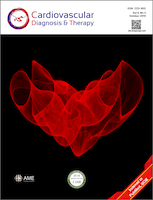
Cardiovascular Diagnosis and Therapy
Elevating Standards in Cardiovascular Medicine and ResearchCardiovascular Diagnosis and Therapy, an esteemed journal in the field of Cardiology and Cardiovascular Medicine, is published by AME PUBLISHING COMPANY, based in Hong Kong, China. With an ISSN of 2223-3652 and an E-ISSN of 2223-3660, this open-access journal aims to present cutting-edge research that significantly advances diagnostic and therapeutic practices in cardiovascular health. Recognized for its impact, it holds a 2023 category quartile ranking of Q2 and is positioned at rank #124 out of 387 in Scopus, reflecting its noteworthy contribution to medical literature with a percentile of 68th. The journal welcomes contributions that span various aspects of cardiovascular research, including clinical trials, epidemiological studies, and innovative therapeutic approaches, making it a vital resource for researchers, practitioners, and students alike, committed to improving cardiovascular care.
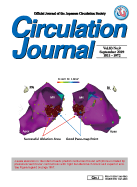
CIRCULATION JOURNAL
Connecting Global Insights in Cardiology and Medicine.CIRCULATION JOURNAL, published by the Japanese Circulation Society, stands as a premier platform for cutting-edge research in the fields of Cardiology and Cardiovascular Medicine. With an impressive impact factor placing it in the Q1 quartile for both cardiology and general medicine, this journal is essential for researchers and practitioners seeking to stay at the forefront of cardiovascular science. The journal's accessible open access options ensure that groundbreaking studies are widely disseminated, reflecting its commitment to advancing medical knowledge and improving patient care. Since its inception in 1996, CIRCULATION JOURNAL has fostered a global dialogue on vital cardiovascular issues, making it a vital resource for academics, healthcare professionals, and students alike. With its base in Tokyo, Japan, the journal not only highlights regional advancements but also contributes significantly to the global medical community.
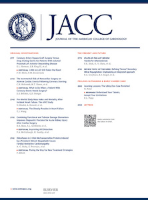
JOURNAL OF THE AMERICAN COLLEGE OF CARDIOLOGY
Pioneering Research in Cardiology and Patient CareJOURNAL OF THE AMERICAN COLLEGE OF CARDIOLOGY, the esteemed publication of Elsevier Science Inc, stands as a premier platform for advancing knowledge in the field of cardiology and cardiovascular medicine. With an impressive impact factor reflecting its prominence—ranked Q1 in its category for 2023 and occupying the 4th position out of 387 in the Scopus listings, firmly placing it in the 99th percentile—this journal is essential for researchers, clinicians, and students alike. Since its inception in 1983, it has continuously provided a vital space for high-quality research and innovative clinical practices, driving forward our understanding of cardiovascular health. While access options are not open, the value of the cutting-edge articles published here cannot be overstated, as they foster collaboration and inform better patient care across the globe. As part of its ongoing commitment to excellence, the journal solicits submissions of original research, reviews, and clinical studies that contribute meaningfully to the field and engage its diverse readership.
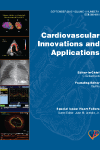
Cardiovascular Innovations and Applications
Connecting researchers and practitioners to elevate cardiovascular medicine.Cardiovascular Innovations and Applications is a premier open-access journal dedicated to advancing knowledge in the field of cardiovascular medicine. Published by COMPUSCRIPT since 2016, this journal provides a platform for the dissemination of innovative research and applications that address crucial topics in cardiology, aiming to bridge the gap between clinical practice and cutting-edge research. With an ISSN of 2009-8618 and an E-ISSN of 2009-8782, it operates on a global scale, facilitating access to high-quality content without financial barriers. The journal is positioned within the Medicine - Cardiology and Cardiovascular Medicine category, and its current Scopus rank of #321/387 reflects its potential for growth and influence in the academic community, being in the 17th percentile. Researchers, healthcare professionals, and students will find Cardiovascular Innovations and Applications an invaluable resource in their quest for the latest findings and advancements in cardiovascular health and treatment methodologies.
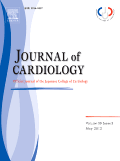
Journal of Cardiology
Advancing cardiovascular science for a healthier future.Journal of Cardiology, published by ELSEVIER, stands as a prominent resource in the field of cardiology and cardiovascular medicine. With a rich history since its inception in 1987, this peer-reviewed journal aims to disseminate cutting-edge research that enhances the understanding and treatment of cardiovascular diseases. Its 2023 ranking places it in the Q2 category within its discipline, reflecting its significance and impact, as evidenced by a Scopus rank of #123 out of 387 journals, positioning it in the 68th percentile of its field. The journal is headquartered in Japan, providing a unique perspective on cardiological advances relevant not only to the Asian continent but also globally. Though it does not currently offer open access, the Journal of Cardiology remains a vital institutional resource for researchers, clinicians, and students seeking to push the boundaries of cardiovascular science and improve patient outcomes.
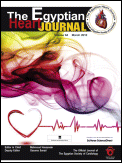
Egyptian Heart Journal
Connecting practitioners and researchers in the heart of science.The Egyptian Heart Journal, published by Springer, is a premier open-access journal dedicated to advancing the field of cardiology and cardiovascular medicine. As of 2023, it holds a Q3 classification within the category, showcasing its growing influence within the research community, and ranks 241 out of 387 in Scopus, reflecting a 37th percentile position. With an E-ISSN of 2090-911X, this journal has been open access since 2011, making it easily accessible to researchers, practitioners, and students alike. The journal aims to disseminate high-quality research articles, reviews, and case studies that contribute to the understanding and treatment of cardiovascular diseases. With its focus on innovative and practical solutions in cardiology, the Egyptian Heart Journal plays a critical role in shaping current and future cardiovascular research. Its global outreach and commitment to open access ensure that vital information is available to a wide audience, enhancing both scholarly discourse and clinical practice in the evolving landscape of cardiovascular medicine.

IJC Heart & Vasculature
Transforming Cardiovascular Care Through Open ResearchIJC Heart & Vasculature is a premier open-access journal published by Elsevier Ireland Ltd, dedicated to advancing research in the fields of cardiology and cardiovascular medicine. Since its inception in 2013, this journal has established itself as a valuable resource for clinicians, researchers, and students keen on exploring the latest developments in heart and vascular health. With an impressive impact factor and ranked within Q2 in its category (2023), IJC Heart & Vasculature has achieved a significant Scopus rank of #125 out of 387, placing it in the 67th percentile of cardiology journals. The journal not only emphasizes high-quality research but also promotes innovative studies that can shape clinical practices and improve patient outcomes. Researchers and professionals can access a plethora of peer-reviewed articles, original research, and comprehensive reviews that unravel the complexities of cardiovascular science. With a commitment to fostering open and impactful dialogue in the field, IJC Heart & Vasculature is poised to be an essential platform for knowledge exchange in the evolving landscape of cardiovascular research.

REVISTA ESPANOLA DE CARDIOLOGIA
Bridging Theory and Practice in CardiologyREVISTA ESPANOLA DE CARDIOLOGIA is a premier journal dedicated to the dynamic field of cardiology, published by EDICIONES DOYMA S A in Barcelona, Spain. With an impressive Q1 status in the Medicine (miscellaneous) category for 2023, this journal is recognized for its significant contributions to cardiovascular research, evidenced by its rank of #61 out of 387 in the Scopus database, placing it within the top 16% of journals in its field. Covering a broad range of topics within cardiology, the journal aims to disseminate high-quality research, clinical studies, and educational content, fostering knowledge sharing among researchers, clinicians, and students alike. While it does not currently offer open access, the journal maintains a commitment to advancing cardiovascular health through rigorous peer-reviewed articles. With a publication history that spans from 2013 to 2024, REVISTA ESPANOLA DE CARDIOLOGIA is an essential resource for those seeking to stay at the forefront of cardiology advancements and practices.

Cardiology Journal
Championing open access to vital cardiology research.Cardiology Journal, published by VIA MEDICA, stands as a prominent resource in the field of cardiology and cardiovascular medicine, with an ISSN of 1897-5593 and an E-ISSN of 1898-018X. Recognized for its Open Access model established since 1994, this journal facilitates widespread dissemination of critical research findings, allowing practitioners and researchers globally to access valuable insights without barriers. Based in Poland, with an address at UL SWIETOKRZYSKA 73, 80-180 GDANSK, it has achieved a respectable Q2 classification in 2023 for both Cardiology and Miscellaneous Medicine categories, reflecting its influence and quality within the scholarly community. With a Scopus ranking placing it at #117 out of 387 in Cardiology, it lies within the 69th percentile, underpinning its commitment to advancing knowledge in cardiovascular health. The journal’s converged years extending from 2006 to 2024 ensure it captures ongoing developments in a rapidly evolving field. As such, the Cardiology Journal serves as an indispensable platform for researchers, professionals, and students dedicated to exploring the frontiers of cardiac science and improving patient care.
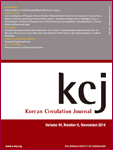
Korean Circulation Journal
Advancing Cardiovascular Knowledge, One Study at a Time.Korean Circulation Journal, published by the Korean Society of Cardiology, has established itself as a prominent platform for disseminating research in the fields of Cardiology and Cardiovascular Medicine. With an ISSN of 1738-5520 and an E-ISSN of 1738-5555, this journal has been at the forefront of cardiovascular science since its inception in 2006 and is projected to continue until 2024. The journal's commitment to quality is reflected in its 2023 category quartiles, ranking in the second quartile (Q2) for both Cardiology and Internal Medicine, as well as its commendable Scopus rankings within the respective fields. Located in South Korea, the journal aims to bridge the gap between cutting-edge research and practical applications, serving as an invaluable resource for researchers, healthcare professionals, and students keen on advancing their understanding of cardiovascular health. Although currently not an open-access journal, it provides a wealth of knowledge that encourages evidence-based practice in clinical settings.